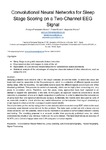Mostrar o rexistro simple do ítem
Convolutional Neural Networks for Sleep Stage Scoring on a Two-Channel EEG Signal
| dc.contributor.author | Fernández-Blanco, Enrique | |
| dc.contributor.author | Rivero, Daniel | |
| dc.contributor.author | Pazos, A. | |
| dc.date.accessioned | 2021-04-05T11:25:19Z | |
| dc.date.available | 2021-04-05T11:25:19Z | |
| dc.date.issued | 2019-06-26 | |
| dc.identifier.citation | Fernandez-Blanco E, Rivero D, Pazos A. Convolutional neural networks for sleep stage scoring on a two-channel EEG signal. Soft Comput.2020; 24:4067-4079 | es_ES |
| dc.identifier.issn | 1432-7643 | |
| dc.identifier.uri | http://hdl.handle.net/2183/27654 | |
| dc.description | This is a pre-print of an article published in Soft Computing. The final authenticated version is available online at: https://doi.org/10.1007/s00500-019-04174-1 | es_ES |
| dc.description.abstract | [Abstract] Sleeping problems have become one of the major diseases all over the world. To tackle this issue, the basic tool used by specialists is the Polysomnogram, which is a collection of different signals recorded during sleep. After its recording, the specialists have to score the different signals according to one of the standard guidelines. This process is carried out manually, which can be highly time consuming and very prone to annotation errors. Therefore, over the years, many approaches have been explored in an attempt to support the specialists in this task. In this paper, an approach based on convolutional neural networks is presented, where an in-depth comparison is performed in order to determine the convenience of using more than one signal simultaneously as input. Additionally, the models were also used as parts of an ensemble model to check whether any useful information can be extracted from signal processing a single signal at a time which the dual-signal model cannot identify. Tests have been performed by using a well-known dataset called expanded sleep-EDF, which is the most commonly used dataset as benchmark for this problem. The tests were carried out with a leave-one-out cross-validation over the patients, which ensures that there is no possible contamination between training and testing. The resulting proposal is a network smaller than previously published ones, but which overcomes the results of any previous models on the same dataset. The best result shows an accuracy of 92.67% and a Cohen’s Kappa value over 0.84 compared to human experts. | es_ES |
| dc.description.sponsorship | Instituto de Salud Carlos III; PI17/01826 | es_ES |
| dc.description.sponsorship | Xunta de Galicia; ED431D 2017/23 | es_ES |
| dc.description.sponsorship | Xunta de Galicia; ED431D 2017/16 | es_ES |
| dc.description.sponsorship | Xunta de Galicia; ED431G/01 | es_ES |
| dc.language.iso | eng | es_ES |
| dc.publisher | Springer Nature | es_ES |
| dc.relation.uri | https://doi.org/10.1007/s00500-019-04174-1 | es_ES |
| dc.subject | Convolutional neural networks | es_ES |
| dc.subject | Deep learning | es_ES |
| dc.subject | Electroencephalography | es_ES |
| dc.subject | Polysomnography | es_ES |
| dc.subject | Signal processing | es_ES |
| dc.title | Convolutional Neural Networks for Sleep Stage Scoring on a Two-Channel EEG Signal | es_ES |
| dc.type | info:eu-repo/semantics/article | es_ES |
| dc.rights.access | info:eu-repo/semantics/openAccess | es_ES |
| UDC.journalTitle | Soft Computing | es_ES |
| UDC.issue | 24 | es_ES |
| UDC.startPage | 4067 | es_ES |
| UDC.endPage | 4079 | es_ES |
Ficheiros no ítem
Este ítem aparece na(s) seguinte(s) colección(s)
-
GI-RNASA - Artigos [195]
-
INIBIC-RNASA-IMEDIR - Artigos [46]






